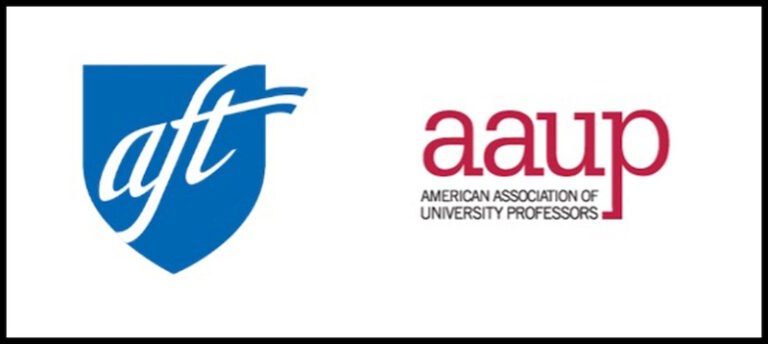| FOR IMMEDIATE RELEASE: June 28, 2012 |
MEDIA CONTACT: Nat Bender, Communications Director American Federation of Teachers NJ (908) 377-0393. nbender@aftnj.org |
Group representing doctors, nurses, faculty and all levels of staff calls for increased financial support for higher education to accompany implementation
TRENTON, N.J.—Representatives of the doctors, nurses, professors and all levels of higher education workers publically supported the amended version of legislation to merge UMDNJ into Rutgers when outstanding governance issues in South Jersey were resolved in a way that preserves the independence and integrity of Rutgers University and its Camden and Newark campuses, as well as Rowan University.
This legislation should be viewed as a first step towards strengthening higher education in New Jersey, said American Federation of Teachers New Jersey (AFTNJ) Political Director Seth Anderson-Oberman. “The successful implementation of this legislation is still dependent on adequate state support for higher education and critical healthcare facilities for New Jersey residents. The projected increase in research revenues identified by proponents of this legislation still requires structural support for higher education as well as bonding capacity to increase facilities.”
Download full release: Reorganization a first step towards prioritizing student success and medical care
It is unfortunate that Rutgers management tried to undo certain key labor protections in last-minute negotiations, according to Patrick Nowlan, Executive Director of the Rutgers AAUP-AFT. “Thankfully those proposed changes were rejected by the Assembly and Senate leaders working to craft a bill that would receive broad support from all stakeholders,” said Nowlan. He said that these protections ensure that quality instruction and research as well as healthcare delivery are assured for residents.
UMDNJ’s American Association of University Professors (UMDNJ-AAUP) Executive Director Alex Bernstein expressed appreciation for the legislation’s protection of vital medical education and healthcare services and that it sets the tone for a smooth transition which respects members’ professional expertise and existing contracts. “We are satisfied that the legislation incorporates many safeguards that will ensure the future viability of the UMDNJ schools and University Hospital,” said Bernstein. “We remain concerned about the lack of appropriate safeguards to ensure the School of Osteopathic Medicine’s accreditation.”
Heath Professionals and Allied Employees (HPAE) Public Policy staffer Jean Pierce said that through the development of the reorganization legislation, HPAE and the Higher Education and Healthcare coalition worked closely with sponsors and legislative leadership to protect the integrity of University Hospital, medical research and health care services provided in Newark and throughout the state.
“The legislation assures continued funding for University Hospital; establishes a Community Oversight Board; assures that health services inside the hospital and in the community will be maintained; and protects the workplace rights of professionals providing these services,” said Pierce.
This legislation also creates new opportunities for Rowan faculty to conduct and collaborate in scholarly research, said Nick Yovnello, Assistant Director of Library Services at Rowan University and President of the Council of New Jersey State College Locals. “The legislation should serve as a building block for better coordination and cooperation among all institutions of higher education in New Jersey to improve educational opportunities for students,” said Yovnello.
Kathy Hernandez, Executive Vice President of the Communications Workers of American (CWA) Local 1031 said the amendments to the legislation safeguard the valuable services her members provide. “>The Higher Education Healthcare Coalition of labor unions at institutions potentially affected by a merger has been issuing calls for a process that puts community medical needs and education first. The group represents more than 30,000 workers at the three institutions and formed to ensure that any reorganization of healthcare education in New Jersey makes each of the institutions stronger and enhances the quality of higher education in New Jersey. The coalition agreed that any reorganization must protect the services currently provided, the skilled professionals who provide those services and the New Jersey communities that rely on these services.



